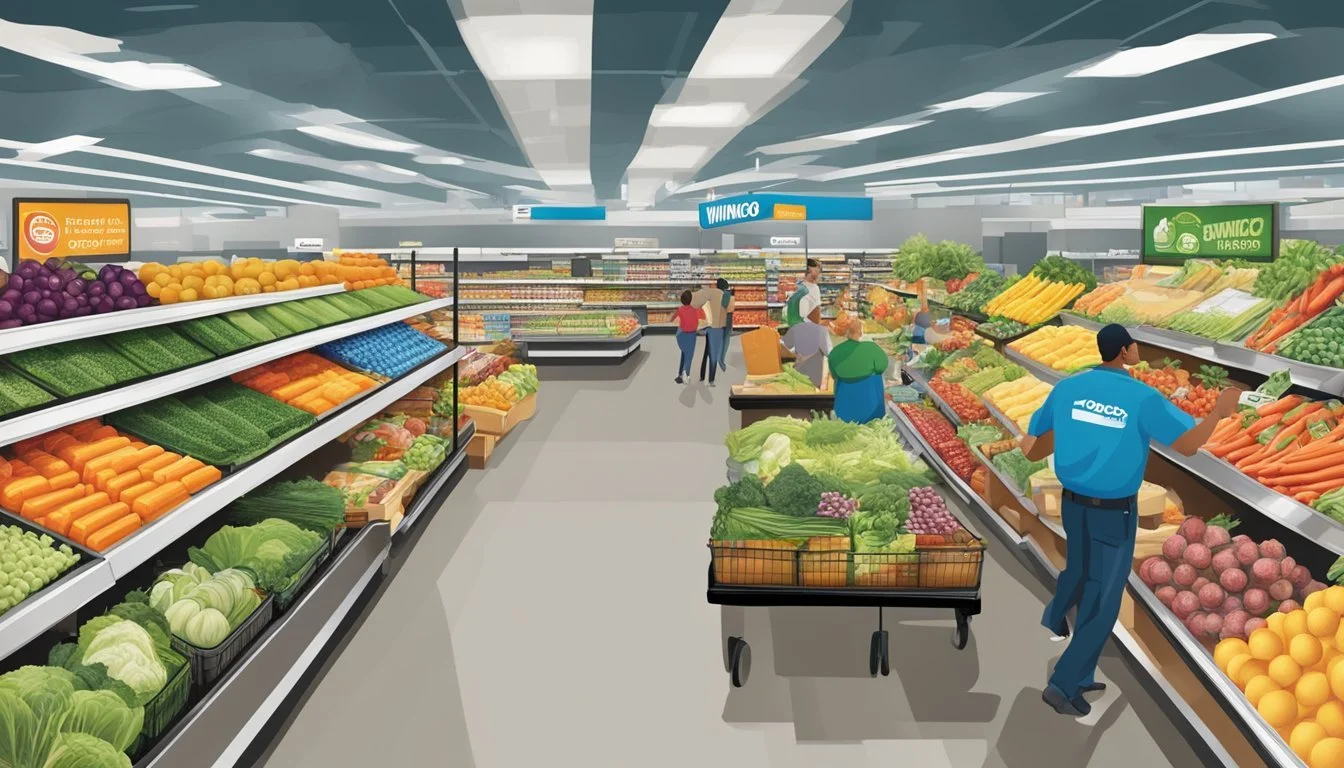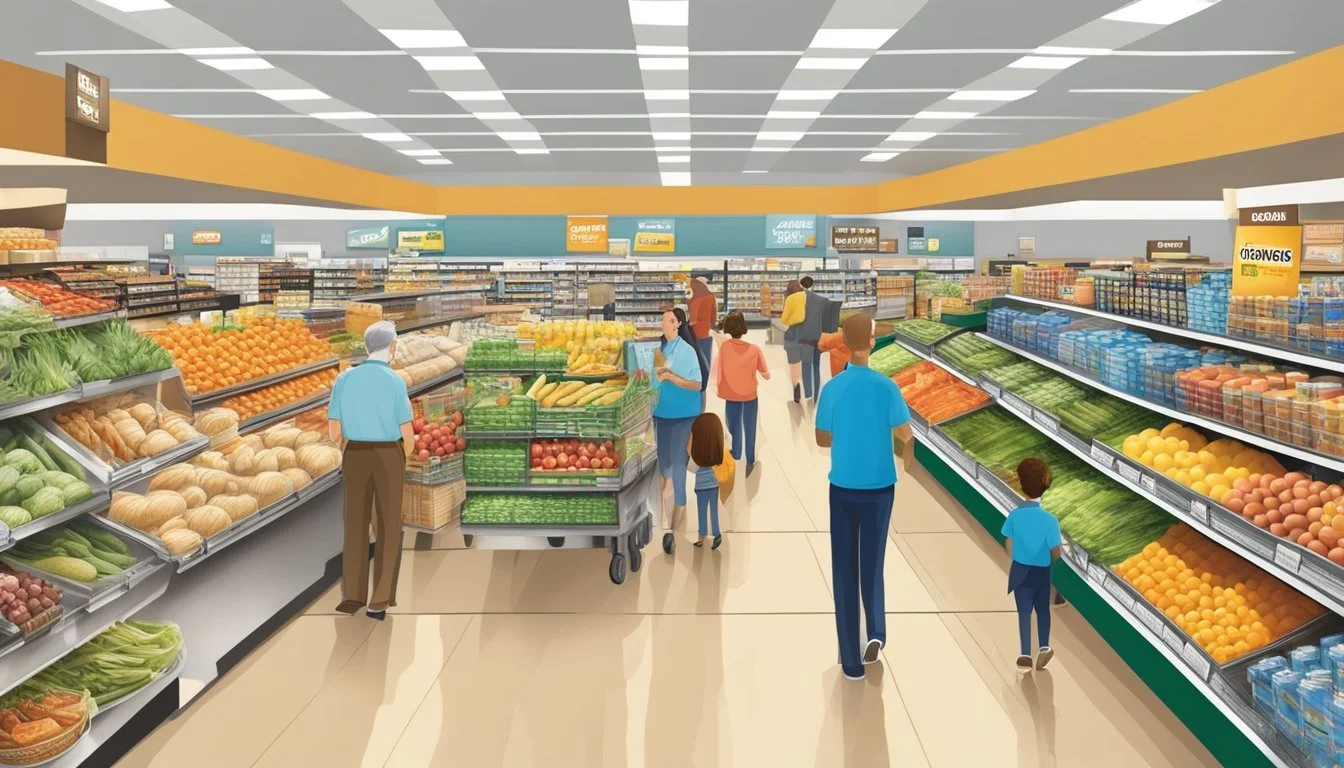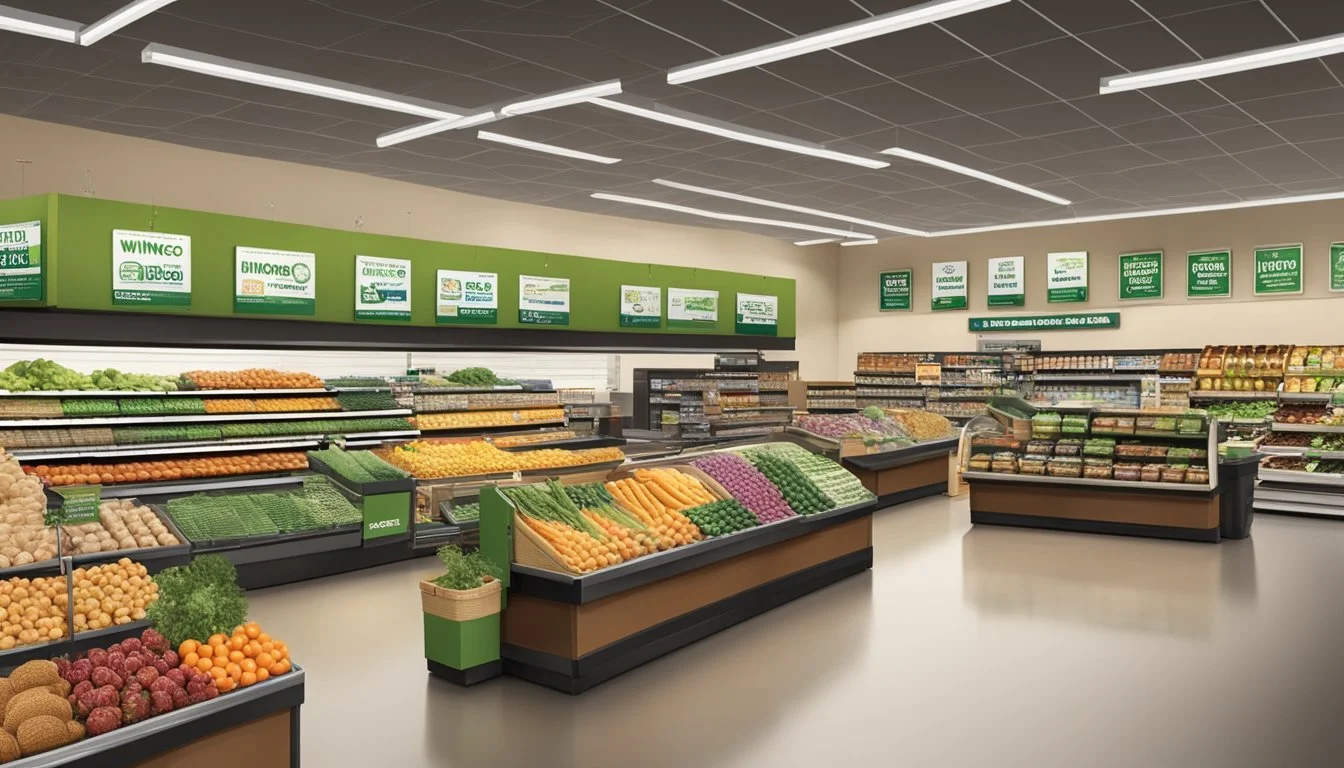Food Lion vs WinCo Foods
A Comprehensive Comparison of Prices, Selection, and Service
Grocery shopping can be a significant expense for many households, making the choice of store crucial for budget-conscious consumers. Food Lion and WinCo Foods are two popular grocery chains that offer competitive prices and a wide range of products. Both stores have their strengths and loyal customer bases.
While both chains aim to provide value, WinCo Foods generally offers lower prices on most items compared to Food Lion. This price difference is often attributed to WinCo's business model, which includes bulk buying options and a focus on cost-cutting measures. Food Lion, on the other hand, may have an edge in terms of convenience and store locations in certain regions.
The choice between Food Lion and WinCo Foods ultimately depends on individual priorities. Factors such as product selection, store atmosphere, and customer service can play a role in decision-making alongside price considerations. Shoppers may find it beneficial to compare prices on their most frequently purchased items at both stores to determine which offers the best overall value for their specific needs.
Company Profiles
Food Lion and WinCo Foods are two distinct grocery chains with unique histories, ownership structures, and operational approaches. Both companies have carved out their own niches in the competitive supermarket industry.
Food Lion: Company Overview
Food Lion is a grocery chain founded in 1957 in Salisbury, North Carolina. It operates over 1,000 stores across 10 southeastern and mid-Atlantic states. The company is a subsidiary of Ahold Delhaize, a Dutch-Belgian retail group.
Food Lion focuses on providing low prices and convenient shopping experiences. Its stores typically range from 25,000 to 35,000 square feet. The chain emphasizes fresh produce and meat departments.
Food Lion has implemented sustainability initiatives and community outreach programs. It offers a loyalty program called "MVP" that provides personalized deals and savings to customers.
WinCo Foods: Company Overview
WinCo Foods is an employee-owned discount supermarket chain based in Boise, Idaho. Founded in 1967, it has grown to operate over 130 stores across the western United States.
WinCo's business model centers on offering low prices through cost-cutting measures. The company buys directly from suppliers and operates its own distribution centers.
Stores are typically larger than traditional supermarkets, averaging 90,000 square feet. WinCo is known for its bulk foods section and no-frills shopping experience.
The employee ownership structure is a key aspect of WinCo's identity. Many long-term employees have become millionaires through the company's stock program.
Pricing Comparison
Food Lion and WinCo Foods both aim to provide competitive pricing, but their strategies differ. WinCo tends to offer consistently lower everyday prices, while Food Lion focuses on targeted discounts and promotions.
Everyday Prices on Common Items
WinCo Foods generally maintains lower base prices on staple grocery items. Their prices are typically 12-30% below average compared to other stores. For example, WinCo sells ground beef for $0.40 per pound less than major competitors.
Food Lion's everyday prices are more in line with traditional supermarkets. However, they run frequent sales and promotions to stay competitive. Food Lion often matches or beats local competitors' advertised prices on popular items.
Both stores offer competitive pricing on store-brand products. WinCo's bulk food section allows customers to purchase exactly the amount needed at lower per-unit costs.
Discounts and Savings Programs
Food Lion operates the MVP Card program, providing exclusive discounts to cardholders. Members receive digital coupons, personalized deals, and earn rewards points on purchases.
WinCo Foods does not offer a loyalty program. Instead, they focus on maintaining consistently low prices across the board. WinCo accepts manufacturer coupons but does not double their value.
Food Lion frequently runs "buy one, get one free" promotions on select items. They also offer weekly digital coupons through their mobile app. WinCo rarely offers special promotions, relying on their everyday low price model to attract cost-conscious shoppers.
Product Variety and Quality
Food Lion and WinCo Foods offer different product selections to cater to diverse customer needs. The two chains prioritize various aspects of their inventory, from fresh produce to store-brand items.
Fresh Produce Selection
Food Lion provides a standard array of fruits and vegetables, focusing on common varieties at affordable prices. Their produce section typically includes seasonal offerings and locally-sourced items when available.
WinCo Foods, on the other hand, boasts a more extensive produce department. They often carry a wider range of exotic fruits and specialty vegetables. WinCo's bulk-buying approach allows them to offer competitive prices on fresh produce.
Both stores strive to maintain quality, but WinCo's larger selection gives them an edge for shoppers seeking variety.
Meat and Seafood Quality
Food Lion offers a reliable selection of meat and seafood products. Their meat department includes standard cuts of beef, pork, and poultry. The seafood counter typically features popular fish varieties and frozen options.
WinCo Foods provides a more comprehensive meat and seafood section. Their stores often include a full-service butcher counter, allowing for custom cuts and special orders. WinCo's seafood selection is generally more diverse, with a mix of fresh and frozen options.
Quality can vary between locations for both chains, but WinCo's larger departments often translate to fresher products due to higher turnover.
Pantry Staples and Dry Goods
Food Lion stocks a solid range of pantry staples and dry goods. Their aisles cover essential items like canned goods, pasta, rice, and baking supplies. The selection tends to focus on well-known national brands alongside their store-brand alternatives.
WinCo Foods excels in this category with its expansive bulk foods section. Shoppers can purchase a wide variety of dry goods in custom quantities, including nuts, grains, spices, and snacks. This approach often results in lower prices and less packaging waste.
WinCo's bulk options give it a distinct advantage for budget-conscious shoppers and those looking to minimize environmental impact.
Store Brands and Organic Options
Food Lion offers its private label products under the "Food Lion" brand. These items cover a range of categories, from pantry staples to dairy products. The chain provides a limited selection of organic options, primarily focusing on popular items.
WinCo Foods features its "WinCo Foods" store brand across various product categories. Their private label offerings often compete with national brands in terms of quality and price. WinCo typically provides a more extensive organic selection, including produce, dairy, and packaged goods.
Both chains use their store brands to offer competitive pricing, but WinCo's broader organic range may appeal more to health-conscious consumers.
Shopping Experience
Food Lion and WinCo Foods offer distinct shopping experiences that impact customer satisfaction and convenience. Their approaches to store layout, customer service, and cleanliness shape how shoppers interact with each retailer.
Store Layout and Convenience
Food Lion emphasizes a straightforward layout with clearly marked aisles and departments. Their stores are typically smaller, making navigation quicker for shoppers on short trips. Produce sections are often near the entrance, allowing easy access to fresh items.
WinCo Foods features larger stores with a warehouse-style layout. They offer bulk bins for dry goods, allowing customers to purchase exact amounts needed. The expansive floor plan accommodates a wider product selection but may require more time to traverse.
Both chains provide shopping carts and baskets. Food Lion tends to have more checkout lanes open, reducing wait times. WinCo often uses a single queue system leading to multiple registers, which can be efficient during busy periods.
Customer Service
Food Lion trains staff to be helpful and approachable. Employees are usually available throughout the store to assist with product locations or answer questions. They maintain a customer service desk for returns and special requests.
WinCo Foods takes a more hands-off approach. Their lower-cost model means fewer staff on the floor. Customers are expected to be more self-sufficient while shopping. This can lead to quicker shopping for those who know what they need but may frustrate shoppers requiring assistance.
Both stores offer bagging services, though WinCo encourages customers to bag their own groceries to keep costs down. Food Lion typically provides full bagging services at checkout.
Cleanliness and Organization
Food Lion prioritizes store cleanliness with regular cleaning schedules. Aisles are kept tidy, and spills are promptly addressed. Their smaller store size allows for more frequent attention to detail in maintenance.
WinCo Foods maintains cleanliness standards despite higher traffic volumes. Their bulk bin areas require extra attention to prevent cross-contamination and spills. The warehouse-style layout can sometimes lead to a less polished appearance compared to Food Lion's more compact stores.
Both chains strive to keep products well-stocked and organized on shelves. Food Lion's smaller inventory makes this task more manageable, while WinCo's larger selection can occasionally result in misplaced items or empty spots during busy times.
Operational Model
Food Lion and WinCo Foods employ distinct operational strategies to serve customers and maintain competitive pricing. Their approaches to business, distribution, and store locations shape their market presence and accessibility.
Business and Distribution Strategies
Food Lion operates as a traditional grocery chain with a focus on efficiency. The company maintains a network of distribution centers to supply its stores across the East Coast. Food Lion emphasizes everyday low prices and frequent promotions to attract budget-conscious shoppers.
WinCo Foods utilizes a unique employee-owned model. This structure allows the company to reduce overhead costs and pass savings to customers. WinCo's warehouse-style stores and bulk buying practices contribute to its ability to offer competitive prices.
Both chains prioritize cost-cutting measures to keep prices low. Food Lion streamlines its product selection, while WinCo encourages customers to bag their own groceries.
Location and Accessibility
Food Lion primarily serves the Eastern United States, with a strong presence in rural and suburban areas. The chain operates over 1,000 stores across 10 states, focusing on smaller-format locations that cater to local communities.
WinCo Foods has a more limited geographic footprint, concentrated in the Western and Southwestern United States. The company operates fewer than 150 stores, typically larger in size than Food Lion locations.
WinCo's stores are often found in metro areas and suburbs, targeting high-volume markets. Food Lion's wider distribution allows for greater accessibility in various communities, including smaller towns.
Both chains strategically position their stores to serve their target demographics and optimize their respective operational models.
Multi-Channel Shopping Options
Food Lion and WinCo Foods offer various ways to purchase groceries beyond traditional in-store shopping. These options aim to provide convenience and flexibility for customers with different needs and preferences.
Online Ordering and Grocery Delivery
Food Lion partners with Instacart to provide online ordering and home delivery services. Customers can browse products, create shopping lists, and schedule deliveries through the Food Lion website or mobile app. Delivery fees apply, but Food Lion occasionally offers promotions for free or discounted delivery.
WinCo Foods does not currently offer its own delivery service. However, in some locations, customers can use third-party delivery platforms like Instacart or DoorDash to order WinCo groceries for home delivery. Availability and fees vary by location and service provider.
In-Store and Curbside Pickup
Food Lion provides curbside pickup through its "Food Lion To-Go" service. Customers place orders online, select a pickup time, and park in designated spaces. Associates bring groceries directly to the vehicle.
WinCo Foods offers in-store pickup for bulk orders placed in advance. Customers can call their local store to arrange pickup of large quantities or special items. However, WinCo does not currently provide a formal curbside pickup service at most locations.
Both stores maintain traditional in-store shopping experiences. WinCo emphasizes its bulk foods section, while Food Lion focuses on weekly promotions and its MVP rewards program.
Customer Satisfaction and Loyalty
Food Lion and WinCo Foods both strive to cultivate satisfied and loyal customer bases. Their efforts are reflected in consumer surveys and loyalty programs designed to enhance the shopping experience.
Consumer Surveys Results and Analysis
Recent surveys indicate varying levels of customer satisfaction for Food Lion and WinCo Foods. Food Lion ranks lower in national comparisons, placing 52nd out of 55 supermarkets in a Consumer Reports study. WinCo Foods, however, performs better, securing the 7th spot in a separate ranking of grocery chains.
Consumers praise WinCo Foods for its competitive pricing and bulk food options. Food Lion receives positive feedback for its convenient locations and quick checkout processes. Both stores face criticism for produce quality and selection, though WinCo Foods edges out Food Lion in this category.
Loyalty Programs and Benefits
WinCo Foods does not offer a traditional loyalty program. Instead, it focuses on consistently low prices across all products. This approach appeals to budget-conscious shoppers seeking everyday savings without the need for coupons or membership cards.
Food Lion operates the MVP Card program, providing personalized discounts and digital coupons. Members can access exclusive deals and earn rewards on select purchases. The program integrates with Food Lion's mobile app, allowing customers to track savings and manage digital coupons easily.
Both stores offer additional perks. Food Lion provides a "Shop & Earn" feature, enabling customers to receive personalized monthly offers. WinCo Foods allows customers to use manufacturer coupons, adding to potential savings despite the absence of a formal loyalty program.
Comparison with Other Retailers
Food Lion and WinCo Foods compete in a crowded grocery landscape with diverse competitors. Their pricing and positioning strategies differ from major national chains, discount retailers, and specialty grocers.
Walmart and Target Market Position
Walmart dominates the grocery sector with its massive scale and low prices. The retail giant offers a wide selection of groceries alongside general merchandise. Walmart's everyday low pricing strategy allows it to undercut many traditional supermarkets.
Target takes a more upscale approach, emphasizing style and quality in its grocery offerings. The company's food sections are typically smaller than Walmart's but feature more organic and premium options.
Food Lion and WinCo position themselves between these two extremes. They focus on value but aim to provide a more traditional grocery shopping experience than Walmart or Target.
Aldi and Lidl Pricing Strategies
Aldi and Lidl, German-owned discount chains, have rapidly expanded in the U.S. market. These stores use a no-frills approach to keep costs down. They stock mostly private-label products and rotate limited-time specialty items.
Both chains typically offer lower prices than Food Lion or WinCo on many staple items. However, their selection is more limited, and stores are generally smaller.
Food Lion and WinCo counter with broader product ranges and more national brands. They aim to balance competitive pricing with greater variety and familiarity for shoppers.
Specialty Stores and Wholesale Clubs
Whole Foods and Trader Joe's cater to health-conscious and gourmet shoppers. These chains focus on natural and organic products, often at premium prices.
Warehouse clubs like Costco and Sam's Club offer bulk quantities at discounted rates. They attract price-sensitive shoppers willing to buy larger sizes.
Food Lion and WinCo position themselves as affordable alternatives to specialty stores. They've expanded their organic and natural offerings while maintaining lower price points.
Against warehouse clubs, Food Lion and WinCo emphasize convenience and the ability to buy smaller quantities. They appeal to shoppers who prefer more frequent trips and manageable package sizes.
Sustainability and Community Impact
Food Lion and WinCo Foods prioritize sustainability and community engagement through various initiatives. Both retailers focus on environmental stewardship and supporting local economies, though their approaches differ in some key areas.
Environmental Policies and Practices
Food Lion has made significant strides in sustainable practices. The company aims to cut food waste in half by 2030 and achieve 100% sustainable plastic packaging by 2025. They've implemented energy-efficient refrigeration systems and LED lighting in stores to reduce their carbon footprint.
WinCo Foods emphasizes bulk purchasing options, which reduces packaging waste. They also use energy-efficient equipment and prioritize local sourcing to minimize transportation emissions.
Both chains have introduced recycling programs for customers and employees. Food Lion's Guiding Stars system helps shoppers make healthier and more sustainable food choices.
Local Economy and Job Creation
Food Lion operates approximately 1,100 stores across 10 states, employing around 60,000 associates. The company invests in local communities through various programs and partnerships.
WinCo Foods, while smaller, is employee-owned. This structure often leads to higher wages and better benefits for workers. The company focuses on opening stores in underserved areas, creating jobs and improving food access.
Both retailers source products from local suppliers when possible, supporting regional economies. Food Lion partners with local food banks to address food insecurity in their communities.







